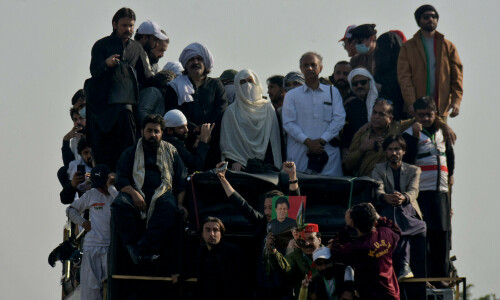 NEW YORK, Sept 14: President Pervez Musharraf told the 60th session of the UN General Assembly on Wednesday that Pakistan was pursuing a composite dialogue with India in the spirit of conflict resolution.
NEW YORK, Sept 14: President Pervez Musharraf told the 60th session of the UN General Assembly on Wednesday that Pakistan was pursuing a composite dialogue with India in the spirit of conflict resolution.
“We want the dialogue process to be result-oriented and initiate a new era of peace and cooperation in South Asia,” the president told 175 heads of state and government attending the annual UN conference.
Appealing passionately to the Indians to reciprocate his gestures for peace, the president said: “Our nations must not remain trapped, by hate and history, in a cycle of confrontation and conflict.”
Gen Musharraf, who has already suggested several proposals for resolving the Kashmir issue but has not yet received a positive response from New Delhi, said that for India and Pakistan to move ahead in their pursuit for peace, it was essential to resolve this conflict.
Emphasizing Pakistan’s policy of maintaining a balance between conventional and strategic weapons, he reminded the world leaders that they needed to prevent the ‘destabilizing accumulation and build-up’ of conventional weapons and forces, especially in regions of tensions, such as the Middle East, South Asia and Northeast Asia.
“Pakistan will continue to promote a nuclear and conventional weapons restraint regime in South Asia,” he said.
But he warned that to end confrontation between Pakistan and India, it was essential to find a just solution of the dispute over Jammu and Kashmir. Such a settlement should be acceptable to Pakistan, India and above all to the people of Kashmir, he said.
Describing terrorism as “a primary threat to today’s world order,” he said the international community must find a comprehensive strategy to deal with it.
Although unlike previous years, he did not directly ask other nations to separate terrorism from legitimate national struggles, the president did urge them to “understand and address the motives behind terrorist acts.”
“These may not justify terrorism; but they explain it,” he said, adding, “to eliminate terrorist violence, we will need to eliminate it in the minds of potential terrorists.”
He said that no religion sanctioned terrorism and the motives of terrorists were always political.
Explaining his strategy of countering terrorism with enlightened moderation, he said: “We need to redress political and economic injustices” to defeat terrorism.
The president said his strategy could help eliminate terrorism and hoped that a commission formed by the UN secretary-general to suggest means for avoiding a conflict of civilizations would consider his theory.
Addressing the issue of nuclear proliferation, which is often used in the US media for maligning Pakistan, he said Islamabad believed that weapons of mass destruction must not fall in the hands of terrorists.
“To prevent this, we must aim to eliminate both the terrorists as well as the weapons of mass destruction.”
Ruling out the use of nuclear weapons for settling disputes, Gen Musharraf said: “The catastrophic consequences of a nuclear war make it imperative to prevent one from ever taking place.”
He said both the proliferation and the perpetual possession of nuclear weapons posed an unacceptable global danger and the international community must evolve a new consensus to achieve disarmament and non-proliferation.
UN REFORM: Earlier, addressing the UN Economic and Social Council meeting on “Financing for Development,” President Musharraf said that the reform and revival of the UN “to which so much energy is being devoted” could only emerge from principles of justice and equality.
He stressed that the UN reform would be hollow without decisive action on the issues of poverty, hunger and disease. He called upon the international community to redress these issues which stalked many nations, saying that world remained pervasively unequal and, in many ways, unjust to the poor and the powerless.
Gen Musharraf said that Official Development Assistance (ODA) was the most important source of financing for the poorest countries. “We welcome the commitments to the 0.7 per cent ODA target made by most of the developed countries.”
“Most developing countries continue to require external financial assistance to directly address the goals of poverty eradication, infrastructure and skills development and creation of capacity for production and trade,” he pointed out.
He welcomed the declaration from the Group of 8 favouring debt cancellation, time-bound commitments for an enhanced ODA, and the efforts for additional innovative financing. However, he said, the real impact would depend on how these schemes were actually implemented.
The president suggested that “foreign direct investment flows can and should be encouraged to a wider circle of developing countries,” saying “they facilitate technology transfer, create jobs, boost productivity, enhance competitiveness and accelerate economic growth and eliminate poverty.”
He underscored the need for an open and equitable international trading system for sustainable growth. The development objectives of the Doha Round must be achieved, he said.














































Dear visitor, the comments section is undergoing an overhaul and will return soon.